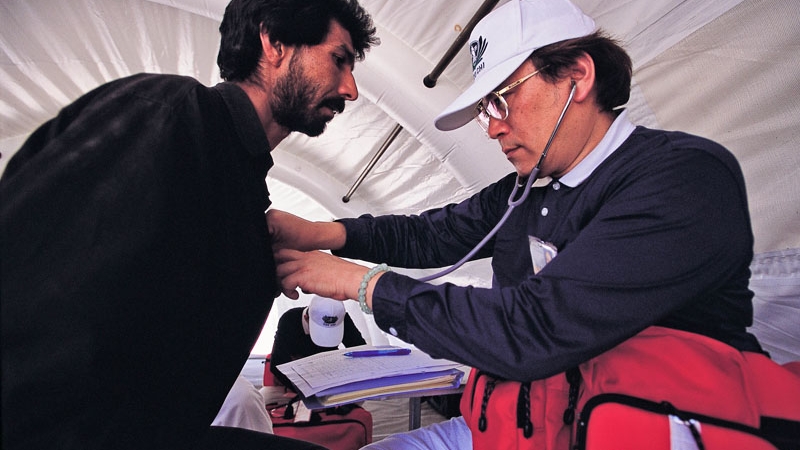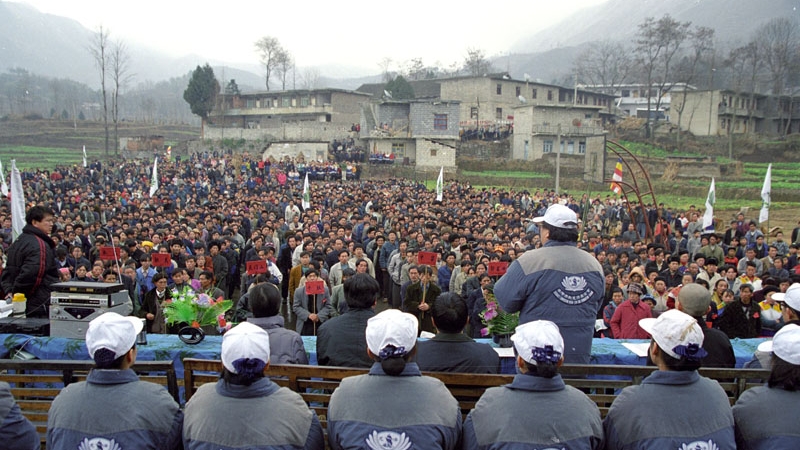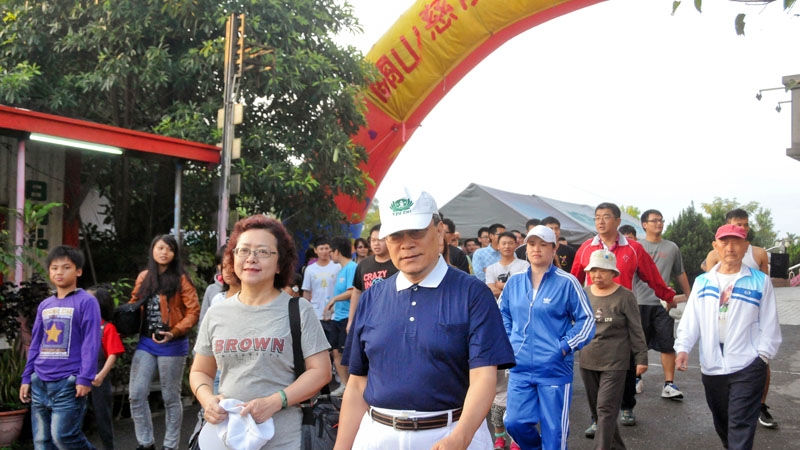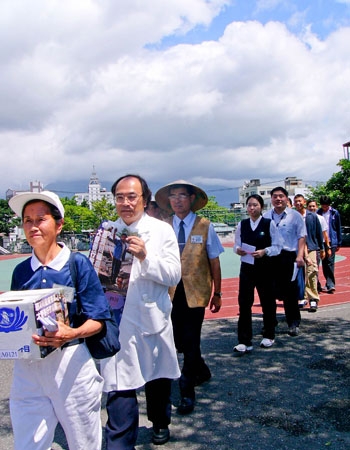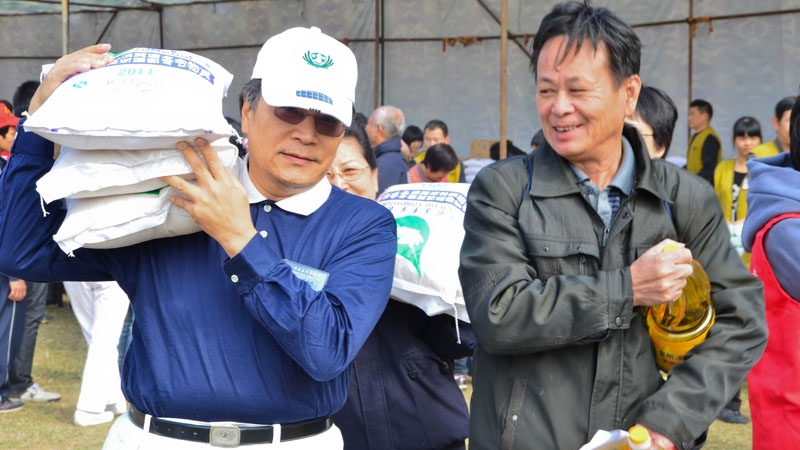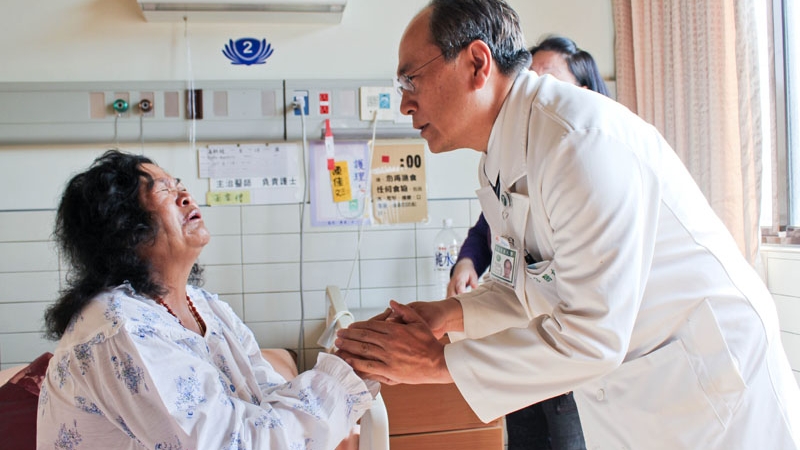By, Lih-Shinn Wang, Vice Superintendent, Hualien Tzu Chi Medical Center
A Sojourn That Stayed for Fifteen Years
In a blink of an eye, I have joined Tzu Chi for almost fifteen years. At the beginning, many people could not believe that a person like me could stay with Tzu Chi for that long. After leaving Taipei Veterans General Hospital, almost every year, I have a job change. Each new work title came with new business cards. Back then, I handed out many business cards because the first thing to do at a new job was to pass along the business cards. At that time, even I became worried about the possibility of changing jobs again soon. After I came to Tzu Chi, I practiced my ritual of passing out business cards. Many friends jokingly asked me when I would update my business card again. Would there be a new one soon? I replied that this time would be different. Indeed, I kept my words, and I have used the same business card for almost fifteen years.
In March of 2004, a major earthquake struck Bam, Iran. Vice Superintendent of Hualien Tzu Chi Hospital, Lih-Shinn Wang traveled to Iran at his own expense and vacation days. He participated in the free clinics.
As a native of Hualien, I attended school and practiced medicine away from home. I worked hard in the field of infection control and immunizations, and rose as far as the Director of Disease Control and Prevention at Department of Health in Taiwan. Perhaps the timing was right, as I developed a longing to return and serve in my hometown. Upon hearing about my intention, my sister remarked, “Hualien is a pond too small for a dragon.” At the time, I was so moved by my sister’s high regard for me. But on the other hand, I did not know that the pond was actually not that small. After joining Tzu Chi to serve others, I then realized how trivial I really am. Prior to this, I had thought I knew everything, but through Tzu Chi, I came to realize that there is room for improvement. There are many things that I could only learn here. In the past, there was no way to appreciate the truly great feeling of making improvement on a daily basis. This has been my biggest turning point.
On January 27 2002, in the inauguration ceremony of Tzu Chi winter distribution aid in Nayong County of Guizhou Province, China, Lihh-Hsin Wang represented to deliver a speech to encourage the residents.
Profound Cultivation in Hualien and Taitung
I recall traveling to Sri Lanka in 2004 with Tzu Chi volunteers to provide free clinic service for victims of the South Asia Tsunami. Likewise in 2009, I also participated in the free clinic in southern Taiwan following Typhoon Morakot. There had been mounting concerns over the spread of diseases. I wanted to fulfill my social responsibilities as a specialist in the science of infectious diseases. On March 11, 2011, Japan suffered a compound disaster of earthquake and tsunami, but the government declined offers of free clinics. Nevertheless, Master Cheng Yen instructed Tzu Chi members to repent and fast, to abstain from false and improper speech, and needless to say, to halt all manners of killing. CEO of Tzu Chi Medical Foundation, Dr. Lin started a special cafeteria on the third floor of the hospital to facilitate vegetarian lunches amongst colleagues. I believe this program received the highest level of satisfaction from the entire hospital staff, for it made us all very happy. Personally speaking, ever since I started my diet, the meals from the cafeteria have taken care of my lunches and dinners, as well as feeding my whole family, and it costs only a small fraction a day. Such genuine care to the employees makes Tzu Chi a top notch working environment.
Other than Hualien County, our medical team has also left their footprints in Taitung. In fact, Kuanshan and I share countless stories due to our special affinity. When I first went to the Kuanshan Tzu Chi Hospital, I was there to help with evaluations, and I always believed that the staff of Hualien Tzu Chi Hospital could provide resource and assistance for infection control. Furthermore, I had many patients of my own coming from Taitung. It would be convenient for them to travel to Hualien from Changbin or Chengong, but would be too far from Dongho or Dulan. If I had outpatient hours in Kuanshan, then these patients would save plenty of time travelling. Thus I started my practice in Kuanshan Tzu Chi Hospital. I go there every Wednesday, and it has been over three years. In the beginning, I had less than ten patients on my daily schedule, but now there are usually around forty patients waiting to see me. Sometimes I would see more patients at Kuanshan than at Hualien, and I feel that every patient is like an old friend to me.
Dr. Lih-Shinn Wang has served at Kuanshan Tzu Chi Hospital for a long time and has built a great bond with the locals. Not only is he helping patients to regain health, he also demonstrated health improvement by losing 10 kilograms himself. At the Kuanshan Tzu Chi Hospital’s 12th Anniversary Marathon, he and his wife joyfully joined the health walk.
I had an obese patient in Kuanshan; originally, nobody believed he would survive. However, after I transferred him to the ICU at Hualien Tzu Chi Hospital, he became healthy and even lost some weight. I also shed ten kilograms by going on a mainly vegetarian and balanced diet. Many people said I look 20 years younger, which is really music to my ears. Now, I am confident to say that we could make every patient healthier and wiser. After all, being human is not only about living, but also about living healthily and happily. I feel very blessed, happy, and honored that I could contribute my medical expertise at Kuanshan, and build my clinical experience at the same time.
In 2008, the Sichuan Earthquake and Myanmar Typhoon took place, with posters and collection box in hand, Dr. Wang (second from the left), campaigned for donations on the street with volunteers and colleagues.
Urgent Care in the Air
When a doctor exercises his expertise, the life-saving experience is not restricted by time or space. Let me share another short story with you. A while ago, the Superintendent’s Office in Hualien Tzu Chi Hospital received a phone call from an airline company, asking, “Did the vice superintendent from this hospital save a passenger on one of our flights a few days ago?” They wanted to convey thanks to him. Then the story became widespread.
The incident happened while I was on a flight leaving Taiwan. A passenger suddenly suffered from chest pain, but could not tell if it was heart or stomach trouble. The stewardess urgently looked for a doctor onboard. Because the examining equipments were limited on the plane, I could only go by continued questioning of the patient’s medical history. Finally I diagnosed it to be stomach pain triggered by hunger, a problem of gastric and duodenal ulcer. Fortunately, a simple stomach medicine alleviated this passenger’s discomfort. This turn of events gave all staff on the aircraft a big sigh of relief. Out of gratitude, the captain upgraded my seat to business class. The rest of the voyage went smoothly and all the passengers were safe.
To be honest, doctors should be most fearful of air travel in this whole world. I have heard about a gynecologist who had to take care of a passenger suffering a heart attack while flying. He could not handle it and had to call a cardiologist acquaintance and followed relayed instructions to treat the patient step by step. Unfortunately, the passenger passed away still, and the incident traumatized the gynecologist for life and he said he’ll never take the plane again.
Around year end of 2011, a winter aid distribution took place in Xiamen, Fujian. Dr. Wang, carried supplies on his shoulder, as he helped with delivery to the local folks.
Unexpectedly on my return trip, the airline voluntarily upgraded me to the first class. Then it dawned on me that doing a good deed could reap reward of multiple folds. But I did not expect reward for what I did! As it turned out, not long after boarding, another emergency was announced: “A passenger is having urgent health issues; would any medical professional onboard please come forward and help out.” I think they already knew I was on the flight, so with no place to hide, I rushed over. This time it was a pregnant woman. Medications must be carefully administered when it comes to expectant mothers, especially during the early stage of pregnancy. Later we determined that this pregnant woman had some skin symptoms. I gave her some general medication to control the symptoms and made her more comfortable without harming the fetus. I had forgotten about this matter upon returning to Taiwan, until the airline called about it.
Dr. Wang is a professional authority in the field of infectious diseases in Taiwan, who has saved many patients inflicted by diseases. Here, Dr. Wang is visiting an old lady, who had previously gone blind due to an infection, but regained her long-lost eyesight. She is expressing her gratitude excitedly.
I think, doing a good deed needs not be known to others nor expect anything in return. However, if you do good deeds to derive happiness from helping people, then it is as the Master stated, “Be willing to do; Be happy to bear”, where blessing and wisdom are cultivated together. I hope to share with more people and hope everyone on Earth is willing to do good things, and in doing so, bring peace to society and keep us away from disasters.
Jing Si Aphorism
To idle is a life of futility;
to endlessly give and benefit humanity
is a life of greater good.

